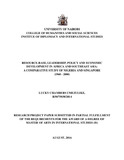| dc.description.abstract | This study is a critical examination of factors that influenced the differing economic development
performances of Africa and Southeast Asia through a comparative study of Nigeria and Singapore.
It examines how policy processes, resource-base and leadership dynamics influenced these
differing development performances. These have been considered to have precipitated the deep
differing economic development indicators of the two regions and countries despite that they used
to be peers in the 19060s. The study also analyses the economic development performances of
Africa and Southeast Asia; thereafter, it concentrates on Nigeria and Singapore. Emphasis is on
these elements of economic development: real GDP and per capita, employment, poverty, literacy
and life expectancy. By comparing the two countries with differing levels of economic
development, this study captures cross-national differences and finds out lessons Nigeria can learn
from Singapore in pursuing inclusive and sustainable economic development.
Furthermore, this study argues that Africa’s low economic development indicators despite
being the richest continent in the world in terms of natural resources have come about largely as a
result of poor leadership, incoherent policies, policy reversals, corruption, poor management of
resources and weak institutions. And that Southeast Asia’s successes, despite with little natural
resources have come about largely as a result of effective leadership, reformative economic
policies, efficient management of resources and strong institutions. The study also argues that: 1).
Resource-base does not explain the difference between the development levels of Nigeria and
Singapore, 2). Export-led industrialisation policy was a key determinant of the different levels of
development between Nigeria and Singapore, and 3). Military-rule interferences negatively
affected Nigeria’s economic development performance, unlike in Singapore. In addition, this study
found out that effective leadership influences economic development through coherent policies and
clinical management of resources at a country's disposal.
The study is based on East Asia model of Capitalism and Resource Curse economic
theories. This is a historical research with a pragmatic philosophical worldview, thus, it adopts
mixed method research methodology. Primary and secondary data are used. The researcher used
interview guide to collect primary data from 22 respondents. Primary and Secondary data were
analysed using statistical and thematic analysis | en_US |



